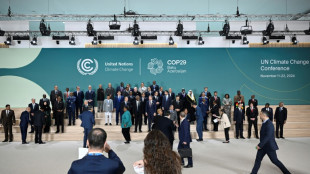
-
 Spurs condemn Man City to fifth straight defeat as Arsenal win
Spurs condemn Man City to fifth straight defeat as Arsenal win
-
Defeated Leipzig lose more ground on Bayern, Frankfurt go second

-
 South Africa put Wales to the sword to wrap up season
South Africa put Wales to the sword to wrap up season
-
Spurs thrash Man City 4-0 to end 52-match unbeaten home run

-
 Defeated Leipzig lose more ground on Bayern
Defeated Leipzig lose more ground on Bayern
-
Venezuela opposition calls for 'enormous' anti-Maduro protest

-
 Inter take Serie A lead as AC Milan and Juve bore in stalemate
Inter take Serie A lead as AC Milan and Juve bore in stalemate
-
England captain George wary of Jones's influence on Japan

-
 Thousands demand lower rents at Barcelona demo
Thousands demand lower rents at Barcelona demo
-
'Puzzle' master Sinner powers champions Italy back into Davis Cup final

-
 Odegaard inspires Arsenal to reignite title hopes
Odegaard inspires Arsenal to reignite title hopes
-
Marseille down Lens to stay in touch with Ligue 1 leaders

-
 Novak Djokovic: All-conquering, divisive tennis superstar
Novak Djokovic: All-conquering, divisive tennis superstar
-
Scott Bessent a credible, safe pick for Treasury: experts

-
 World approves UN rules for carbon trading between nations at COP29
World approves UN rules for carbon trading between nations at COP29
-
Putin signs law letting Ukraine fighters write off bad debts

-
 Thousands march against Angola govt
Thousands march against Angola govt
-
Ireland coast to victory as they run Fiji ragged

-
 Atletico make comeback to beat Alaves as Simeone hits milestone
Atletico make comeback to beat Alaves as Simeone hits milestone
-
Aid only 'delaying deaths' as Sudan counts down to famine: agency chief

-
 Leipzig lose more ground on Bayern with Hoffenheim loss
Leipzig lose more ground on Bayern with Hoffenheim loss
-
Arsenal back to winning ways, Chelsea up to third in Premier League

-
 Sinner powers Davis Cup holders Italy past Australia to final
Sinner powers Davis Cup holders Italy past Australia to final
-
Andy Murray to coach Novak Djokovic

-
 Leipzig lose ground on Bayern, Dortmund and Leverkusen win
Leipzig lose ground on Bayern, Dortmund and Leverkusen win
-
Fear in central Beirut district hit by Israeli strikes

-
 Chinese film about Covid-19 wins Taiwan's top Golden Horse prizes
Chinese film about Covid-19 wins Taiwan's top Golden Horse prizes
-
Tuipulotu puts anger behind him as he captains Scotland against native Australia

-
 Inter smash Verona to take Serie A lead
Inter smash Verona to take Serie A lead
-
Mass rape trial sparks demonstrations across France

-
 Lebanon says 15 killed in Israeli strike on central Beirut
Lebanon says 15 killed in Israeli strike on central Beirut
-
Eddie Jones will revel in winding up England - Genge

-
 Chelsea see off Leicester on Maresca's King Power return
Chelsea see off Leicester on Maresca's King Power return
-
Storms bring chaos to Ireland, France, UK

-
 Berrettini gives Italy edge on Australia in Davis Cup semis
Berrettini gives Italy edge on Australia in Davis Cup semis
-
Amber Glenn storms to gold in Cup of China

-
 High-flying Chelsea see off Leicester
High-flying Chelsea see off Leicester
-
Climate-threatened nations stage protest at COP29 over contentious deal

-
 Families fleeing after 32 killed in new sectarian violence in Pakistan
Families fleeing after 32 killed in new sectarian violence in Pakistan
-
Ancelotti says 'ugly' to speculate about Mbappe mental health

-
 Failure haunts UN environment conferences
Failure haunts UN environment conferences
-
Colapinto in doubt for Las Vegas GP after crashing

-
 Lebanon says 11 killed in Israeli strike on central Beirut
Lebanon says 11 killed in Israeli strike on central Beirut
-
Three arrested in Spain for racist abuse at Liga Clasico

-
 Pope to skip Notre Dame opening for Corsica visit
Pope to skip Notre Dame opening for Corsica visit
-
Tokyo police care for lost umbrellas, keys, flying squirrels

-
 Neuville closes in on world title after Rally Japan recovery
Neuville closes in on world title after Rally Japan recovery
-
Jaiswal slams unbeaten 90 as India seize control against Australia

-
 'Nice surprise' for Verstappen to edge Norris in Las Vegas GP qualifying
'Nice surprise' for Verstappen to edge Norris in Las Vegas GP qualifying
-
Indian teen admits to 'some nerves' in bid for world chess crown


In Davos, Ecuadoran activist seeks end to fossil fuel addiction
Ecuadoran Amazon activist Helena Gualinga has come to the meeting of global elites in the Swiss Alpine village of Davos with a clear message: companies must stop new fossil fuel projects.
Gualinga, 20, has become a spokesperson for her Kichwa Sarayuku indigenous community and its struggle against oil companies in the rainforest.
This week, she joined fellow young climate activists Greta Thunberg of Sweden, Vanessa Nakate of Uganda and Luisa Neubauer of Germany in launching a petition billed as a "cease and desist notice".
The petition demands that energy CEOs "immediately stop opening any new oil, gas, or coal extraction sites".
"We are from different parts of the world but we are fighting for the same purpose," Gualinga told AFP on Tuesday at the annual World Economic Forum.
"It is a call to say 'enough is enough' because we have said it many times. We need urgent action," she said.
The online petition -- which warns that citizens around the world will consider taking legal action to hold companies accountable -- has garnered more than 800,000 signatures since its launch earlier this week.
"We have to leave oil under the earth," Gualinga said.
"The rights of indigenous communities are very important in this regard."
- 'Can't trust states' -
A decade ago, the Sarayaku community won a landmark case at the Inter-American Court of Human Rights which ruled that the Ecuadoran state had violated their rights to be consulted when oil exploration rights were granted on their land.
"I think this shows the world that such a small community but so well organised can manage to expel a company, can ensure that its rights are respected," Gualinga said.
Despite her efforts on fossil fuels, Gualinga doubts she will see results in forums such as the UN's COP climate talks.
The last meeting in November, COP27 in Egypt, ended without commitments to phase out fossil fuels.
The next talks will be hosted later this year in the United Arab Emirates, which appointed the head of the national oil company as president of COP28.
"We cannot trust states to reach agreements that really manage to mitigate and stop climate change," Gualinga said.
"We know where this fight is headed. Indigenous peoples have been doing this since the first colonisation," she said, hoping that her community will one day obtain autonomy with territories with clear borders.
P.Anderson--BTB




